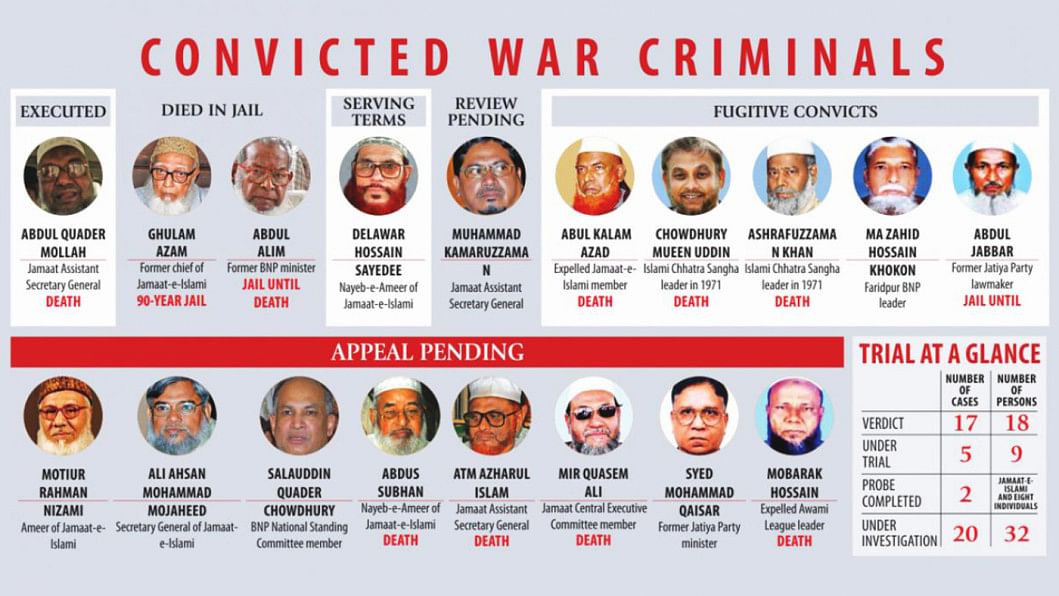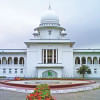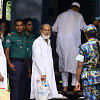Five years, 17 verdicts

The trial of war criminals passed yet another year with two special war crimes tribunals having delivered eight verdicts so far to the satisfaction of the justice seekers.
But delay in initiating trial against Jamaat-e-Islami as an organisation for its alleged crimes committed during the Liberation War frustrates many. Besides, no verdict of the tribunals was executed in the last one year due to legal proceedings at the Supreme Court, further extending people's long wait.
The Awami League-led government formed an International Crimes Tribunal (ICT) on March 25, 2010 in line with the party's electoral pledge to try the war criminals. A second tribunal was formed on March 22, 2012 to expedite the trial.
In last one year, the International Crimes Tribunal-1 delivered verdicts in the cases against Motiur Rahman Nizami, MA Zahid Hossain Khokon, Mobarak Hossain, ATM Azharul Islam and Abdul Jabbar. All but Jabbar were sentenced to death for their wartime crimes. Jabbar was sentenced to imprisonment until death for the same offences.
The International Crimes Tribunal-2 has meanwhile delivered verdicts in the cases against Abdus Subhan, Mir Quasem Ali and Syed Mohammad Quasar. All of them were sentenced to death for their wartime crimes.
Prosecutor Rana Dasgupta said there were many limitations, but the prosecutors tried their best.
"The trial was actually an unfinished task of the Liberation War. We have tried to complete it with honesty and sincerity. We believe we have not failed. But it's the people who will evaluate whether we are successful," he told The Daily Star last night.
Sanaul Huq, a senior member of the investigation agency, added, "We are satisfied with our performance and believe that we have been able to meet the aspiration of the people to some extent."
But the prosecution could not initiate trial against Jamaat-e-Islami as the government has yet to take initiatives to bring amendment to the International Crimes (Tribunals) Act, 1971, which is considered as the main obstacle to prosecuting the party.
The investigation agency on March 25 last year completed its probes into the alleged war crimes committed by Jamaat and handed over the report to the prosecution.
Rana Dasgupta said they were waiting for the amendment so that Jamaat could be prosecuted. The matter whether trial of Jamaat could be held at all would be the centre of all discussion next year, he added.
Shyamoli Nasrin Chowdhury, widow of martyr physician Alim Chowdhury, feels relieved that the AL government initiated the trial after four decades of wait. "But it hurts when we see delay in execution of the verdicts and beginning of Jamaat's trial."
"The trial of Jamaat should be taken seriously. We do not like negligence," said Shyamoli, also the senior vice-chairperson of Ekattorer Ghatak Dalal Nirmul Committee.
TRIBUNALS GET OWN MANPOWER
For smooth functioning of the special courts, the tribunal authorities have meanwhile begun recruiting their own manpower, a need that was felt since the beginning of the war crimes trial.
The recruitment is going on in phases. The tribunals have so far been functioning with personnel hired from the High Court, Dhaka District and Sessions Judges Courts, Court of Chief Metropolitan Magistrate, Dhaka, and Administrative Tribunals.

 For all latest news, follow The Daily Star's Google News channel.
For all latest news, follow The Daily Star's Google News channel. 








Comments